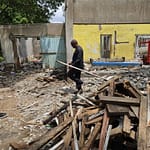The true wealth of any state lies not in its concrete structures or financial reserves, but in the safety and well-being of its people. In Kebbi, this wealth is under a brutal, sustained assault from banditry, leaving behind a trail of shattered homes, stolen futures, and immeasurable grief. While statistics capture the scale, they cannot convey the quiet terror that permeates communities, the fear whispered in homes, the lives held hostage by violence. It is
Table of Contents
- The Governor’s Solemn Vow: Lives Beyond Ledger
- Emptying the Coffers: Blueprint for a Financial Frontline
- Beyond the Billions: Accountability and Sustainable Security Strategies
- A Collective Stand: Mobilizing Society Beyond the Treasury
- Wrapping Up

The Governor’s Solemn Vow: Lives Beyond Ledger
In the face of a relentless shadow, a promise rings out – one not tallied in budget sheets or fiscal reports, but etched in the very soul of leadership. Governor Idris’s vow to “empty the purse” isn’t merely a headline grab; it’s a fundamental shift in perspective, placing the priceless value of human life above the rigid columns of a ledger. This declaration signifies a stark, perhaps desperate, recognition that traditional financial constraints crumble when confronted by the primal need to protect citizens from terror. It speaks to a moment of truth where the arithmetic of survival overrides the economics of administration. The message is clear: the state’s wealth is secondary to its people’s safety.
- This radical pivot prioritizes immediate safety over long-term economic planning.
- It implies a willingness to deploy unprecedented resources towards anti-banditry efforts.
- The conventional metrics of governance are temporarily suspended for a higher calling: preservation of life.
This isn’t a policy adjustment; it’s a moral stand. The commitment to expend every available resource underscores the severity of the threat and the deep conviction that no cost is too high when lives hang in the balance. It’s a gamble, certainly, with immense implications for the state’s future financial health, but one born from the agonizing calculus of desperation and duty. The governor is essentially declaring that the state’s true wealth resides not in its treasury, but in the beating hearts of its people. This solemn vow reshapes the very definition of prosperity for Kebbi, framing security not as a cost centre, but as the ultimate, non-negotiable investment.
| Conventional Priority | Governor’s Vow |
|---|---|
| Fiscal Balance | Human Safety |
| Economic Growth | Ending Terror |
| Budget Constraints | Saving Lives |

Emptying the Coffers: Blueprint for a Financial Frontline
When faced with an existential threat that preys on its people, the state’s financial pulse becomes the last line of defense. The decision to potentially drain the public purse isn’t made lightly; it’s a stark acknowledgement that human lives hold a value infinitely greater than any balance sheet figure. This strategy is less a conventional budget allocation and more an emergency drawdown – a commitment to deploy every available kobo from the state’s reserves into the very heart of the conflict zones. It signifies a willingness to sacrifice fiscal comfort, planned development, and even future infrastructure projects, should it mean shielding citizens from the immediate terror gripping communities. The vaults, built for years of careful savings and investment, are now viewed as essential tools in a fight for survival, ready to be prised open and its contents funnelled directly into the critical needs of this volatile frontline.
This abrupt shift in financial priorities requires a clear, albeit urgent, framework. Resources earmarked for less immediate concerns are being rerouted, creating a bespoke war chest for security operations and humanitarian aid. The focus narrows sharply onto bolstering security forces, providing necessary equipment, and offering direct support and relief to affected populations. This isn’t just about buying weapons; it’s about logistical support, intelligence gathering funding, community engagement initiatives in vulnerable areas, and the immediate welfare of those displaced or harmed. Consider the vital areas demanding this unprecedented financial injection:
- Security Force Reinforcement: Funding for personnel, vehicles, and communication tools.
- Intelligence and Surveillance: Investing in technologies and networks to pre-empt attacks.
- Community Support & Relief: Providing shelter, food, and medical aid to victims.
- Technology & Equipment: Acquiring specialized gear for counter-insurgency operations.
While the specifics remain fluid in a crisis, the intent underscores a grim reality: solvency today might be jeopardized for survival tomorrow. A simplified breakdown of potential expenditure focus areas might look something like this:
| Priority Area | Example Focus |
|---|---|
| Immediate Security | Operational Logistics |
| Victim Support | Relief Package Distribution |
| Information Network | Communication Equipment |

Beyond the Billions: Accountability and Sustainable Security Strategies
The commitment to ’empty the purse’ underscores the dire urgency of the situation, recognizing that human lives are priceless. However, the sheer scale of resources potentially involved immediately brings to the forefront the crucial question of accountability. How is this substantial funding tracked, allocated, and evaluated to ensure it translates directly into enhanced security and relief for affected communities? Without robust oversight mechanisms, transparency in procurement processes (for equipment, intelligence, etc.), and clear metrics for success beyond immediate reactions, there’s a significant risk. Funds, however well-intentioned their release, could be diverted, misused, or simply diluted without achieving their intended impact. Public trust, vital for any enduring security strategy, hinges on demonstrating that every naira released contributes meaningfully to the safety of citizens. Key areas demanding rigorous scrutiny include:
- Allocation for operational costs and personnel welfare
- Investment in intelligence gathering assets and networks
- Support and rehabilitation programs for victims and displaced persons
- Procurement of necessary security equipment and technology
Moving past emergency spending towards a truly sustainable security architecture is perhaps the greater challenge. An ’empty purse’ spent solely on immediate responses-be it compensating victims, paying for operations without strategic goals, or even ransom-related activities-risks becoming a bottomless pit without providing lasting solutions. Sustainable security requires addressing the multifaceted roots of banditry: economic marginalization, lack of infrastructure, porous borders, and community grievances. It demands investment in preventative measures, building local intelligence capabilities, fostering trust between security forces and communities, and creating economic alternatives for vulnerable populations. Strategic investment lays the groundwork for long-

A Collective Stand: Mobilizing Society Beyond the Treasury
While the readiness to pledge material wealth to protect lives is a potent symbol, the true fortification against the shadow of banditry lies not just in the state’s Coffers, but in the collective consciousness and courage of its people. Every kobo released from the treasury is a vital artery, but it flows strongest when met by the robust circulation of community vigilance and mutual support. This isn’t merely a financial battle; it is a struggle for the soul of the land, demanding a reservoir of resilience drawn from neighbours watching out for neighbours, elders guiding youth, and every citizen becoming a proactive node in a network of safety. It calls for a mobilization that transforms passive hope into active participation, weaving a human shield stronger than any monetary barrier.
Shifting the paradigm beyond fiscal expenditure necessitates harnessing diverse societal strengths. This involves fostering environments where:
- Communities feel empowered to share credible intelligence without fear, becoming the eyes and ears on the ground.
- Local initiatives for self-protection, like reformed vigilante groups working in harmony with security forces, are supported and regulated.
- Psychosocial support systems are established and strengthened for victims and affected communities, healing trauma and rebuilding trust.
- Inter-communal dialogue and conflict resolution mechanisms are reinforced to address underlying tensions exploited by criminal elements.
Beyond these actions, consider the intangible yet crucial contributions:
| Contribution Type | Societal Resource |
|---|---|
| Information | Shared whispers, observant eyes |
| Coordination | Neighbourhood watches, community meetings |
| Assistance | Communal care, offered shelter |
| Moral Boost | Shared resolve, stories of hope |
This holistic approach, where every hand contributes to the collective safety net, amplifies the impact of governmental efforts exponentially, turning a fiscal commitment into a societal victory.
Wrapping Up
As the sun sets over Kebbi’s vast horizons, Governor Idris’s bold commitment to empty the purse in defense of his people stands as a beacon of hope amid the shadows of banditry. It’s a clarion call that transcends mere politics-a heartfelt vow that life, above all, is priceless. In this relentless battle against violence, the true currency is courage, and Kebbi’s resolve shines brighter than ever. When leadership chooses sacrifice over comfort, communities find strength to heal, rebuild, and dream anew. The path ahead remains challenging, but with unwavering determination lighting the way, Kebbi’s story could very well become one of triumph where fear once ruled.














